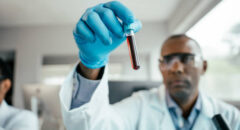 (BlackDoctor.org) — Two clinical trials conducted in three African nations demonstrated for the very first time that daily antiretroviral (ARV) drug therapy can dramatically reduce the risk of HIV infection for heterosexual couples. The results were announced Wednesday by the Centers for Disease Control and Prevention (CDC). The “groundbreaking findings” in HIV biomedical prevention provide additional evidence that medications originally developed to save lives also offer a powerful way to prevent new infections. This strategy of providing daily ARVs to uninfected people to reduce their risk of HIV infection is called pre-exposure prophylaxis (PrEP).
(BlackDoctor.org) — Two clinical trials conducted in three African nations demonstrated for the very first time that daily antiretroviral (ARV) drug therapy can dramatically reduce the risk of HIV infection for heterosexual couples. The results were announced Wednesday by the Centers for Disease Control and Prevention (CDC). The “groundbreaking findings” in HIV biomedical prevention provide additional evidence that medications originally developed to save lives also offer a powerful way to prevent new infections. This strategy of providing daily ARVs to uninfected people to reduce their risk of HIV infection is called pre-exposure prophylaxis (PrEP).
PrEP offers a new strategy to prevent HIV cases acquired through heterosexual contact — the epidemic’s primary method of global transmission and a disproportionate factor in Black America.
“I was very excited to hear the results,” says Dazon Dixon Diallo, M.P.H., founder and president of the Atlanta-based Sister Love, an AIDS and reproductive-justice organization targeting Black women worldwide. “These two studies are the only two we know that are giving feedback on biomedical prevention for women. This is a real prevention option.”
The smaller study, known as TDF2, included about 1,200 sexually active, HIV-negative men and women in Botswana. The research, funded by the CDC, found that taking a once-daily tablet of the ARV Truvada — a combination of the drugs tenofovir and emtricitabine, sold by pharmaceutical company Gilead Sciences — reduced the risk of acquiring HIV infection by roughly 63 percent.
The second study, known as Partners PrEP, recruited 4,758 sero-discordant couples — those in which one partner has HIV and the other does not — in Kenya and Uganda. The uninfected partners were randomly assigned to take either Truvada, Viread — an ARV containing only tenofovir, also marketed by Gilead — or a placebo. The HIV-negative partners taking Truvada saw their infection risk drop by 73 percent, while those taking Viread saw theirs drop by an average of 62 percent.
The Partners PrEP findings were so conclusive that researchers ended the trials early because it would have been “unethical” to continue providing participants with placebos. Partners PrEP was conducted by researchers from the University of Washington and funded by the Bill and Melinda Gates Foundation.
The two new studies restore confidence in PrEP’s potential to reduce HIV infections among women and heterosexual couples. Earlier this year, researchers reported poor results from a similar study conducted in Kenya, South Africa and Zimbabwe.
“The results have particular significance for Black women in the United States [because] the vast majority [who get] infected by HIV [are infected] through heterosexual transmission,” says Kevin Fenton, M.D. Ph.D., director of the CDC’s National Center for HIV/AIDS, Viral Hepatitis, STD and TB Prevention.
“PrEP would provide women with a much-needed way to prevent HIV that they can control for themselves, rather than relying on a male partner to use a condom,” he says. “Especially for women who may be in situations where they are not able to negotiate condom use, this type of prevention method — controlled solely at the discretion of the person taking the pills — would be very important.”
HIV infection rates for Black women are nearly 15 times higher than those of white women and nearly four times of Latinas.
The studies come on the heels of several promising clinical trial findings around the efficacy of vaginal microbicides and PrEP for men who have sex with men. And only two months ago, exciting new research showed that when participants started taking ARVs almost immediately after being diagnosed with HIV rather than waiting until the disease had progressed, they were much less likely to infect others. That strategy is known as treatment as prevention.
“For those of us that have been fighting for so long and looking for any tool in the prevention toolbox that shows promise, it’s always exciting,” says Dazon Diallo. “But we still have to deal with some of those very important issues such as who will have access and how they will get what they need.
“We still need to learn a lot more,” she continues. “The studies were in Africa. Their situations, cultures and especially the gender dynamic are similar but still very different. The behavior around taking daily meds is very different. . . . This is an opportunity to help us recognize the threat of HIV especially to African American women It’s another catalyst to helps us go out and educate.”
Kali Lindsey, senior director of federal policy at Harlem United, agrees. “Historically, Black communities have been seen as not having the capacity to manage these biomedical technologies than other communities,” he says. “One of the things we’ve seen is that Black individuals who are HIV positive are being offered treatment later. Black individuals who are diagnosed with HIV are entering the care system later. These are things we have to work on and see what strategies will work best.”
Lindsey echoes most other HIV/AIDS professionals and stresses that PrEP is not a magic pill. “This is combination prevention. Condoms will not work for everyone. PrEP can be very successful for a certain population. But we can’t throw the baby out with the bathwater.”
“PrEP is a lifetime commitment,” explains attorney Vanessa Johnson, deputy executive director of the National Association of People With AIDS. “If you tend not to take your medications, if you tend not to use condoms, if you don’t practice safe, physical and emotional relations with people … it’s going to be interesting to see how it plays out.”
Johnson has a final criticism for those who suggest that PrEP should be marketed as a “boutique” intervention available only to those who can afford it. “It should be available to anybody who wants it. This demonstrates that our health-care system is out of whack. Because if we are having the discussion of who is going to get it and who is not, something is very wrong,” she says.









